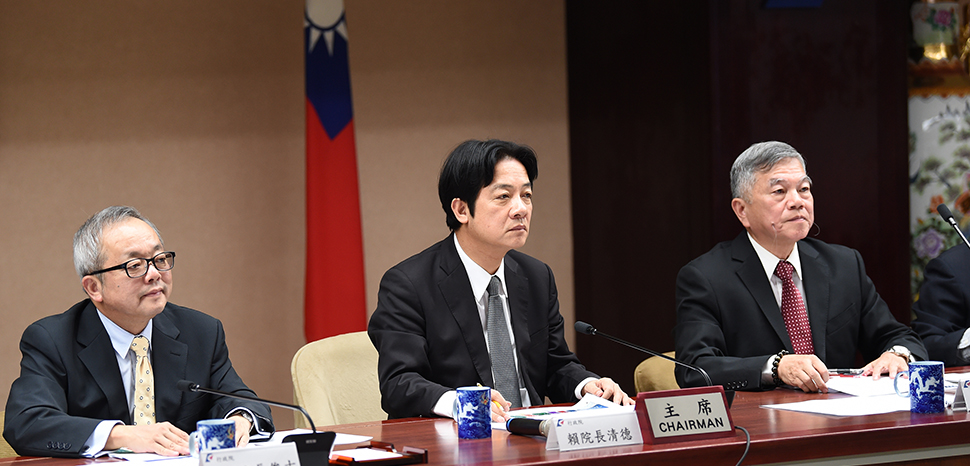There’s no need for any reading of tea leaves to know that Taiwan has emerged as a critical flashpoint between the United States and China. Taipei’s leading president candidate, William Lai, from the Democratic Progressive Party (DPP) maintains a slim margin of a lead over the opposition candidate, Hou Yu-ih, the nominee from the Kuomintang (KMT), and trailing at time of writing is Ko Wen-je, founder and candidate for the Taiwan People’s Party.
On cross-strait relations and this is chiefly what Washington is viewing — all three candidates share similarities: a rejection of any formal independence declarations, saying no to China’s maritime territorial claims, and a firm commitment to U.S. relations.
For now, the U.S. Congress appears to be in bipartisan lockstep about the Biden’s administration firm commitment to a policy of maintaining democratic Taiwan’s de-facto independence in the face of Chinese Communist Party threats to annex the island of 23 million people by political, military, or economic means.
No matter who wins the Taiwan general election, there will be no change in Washington’s position on Taiwan. Numerous bipartisan Congressional leaders have already introduced legislative bills to counter China’s threats to US national security, the South China Sea, and to extend support for Taiwan. In fact, led by the two very different administrations from former President Trump to Biden, defending the U.S. against adverse Chinese attacks and practices has remained at the top of U.S. national security priorities.
This rise in attention is revealed in the more than 250 bills related to China from January 2023 through May 2023. While the US Congress has at times displayed complete dysfunction on debt ceilings and overall budgets, there is agreement across the aisles on China’s clear and present danger. As a result, US lawmakers have been unified on a range of bills and issues ranging from trade, national security, and sanctions, to human rights, democratic values, Taiwan, and China’s global influence.
The primary trends seen in U.S. legislation introduced in 2023 show little signs of change in 2024:
- Trade remains a dominant feature of the legislative agenda concerning China.
- National security interests encompass a range of bills.
- Sanctions will remain the prominent tool to pressure China.
- The economic significance of Hong Kong and Taiwan.
- Concern about China’s global influence.
Washington is currently focused on addressing multiple challenges posed by Beijing. China is actively working to undermine U.S. power and influence while seeking dominance in the Asian region. Secondly, there is growing concern over Chinese initiatives aimed at controlling high-technology industries and the related supply chains. One aspect that has been underreported is Beijing’s sway over rare earth elements and its strategic plan to exploit the ocean floor through seabed mining. This effort aims to secure control over energy rich nodules containing essential elements such as cobalt, lithium, and manganese, crucial for powering the transition to renewable energy. These minerals will play a critical role in the U.S., contributing to national interests in transportation, defense, aerospace, electronics, and energy.
Taiwan’s National Security Importance to US
In the eyes of the Biden administration and among U.S. Congressional members, Taiwan figures prominently in Washington’s efforts to curb and defend against China’s challenges. Congress has increasingly sought to reduce U.S. reliance on Chinese imports. Lawmakers have placed great emphasis on concerns about supply chain resilience. These areas include strategically critical sectors or economically significant sectors such as solar and renewable energy.
Where the sensitive issue of Taiwan is concerned, bipartisan members have continued to propose and develop deterrence measures in case of “aggression by the People’s Republic of China against Taiwan” or “a military invasion of Taiwan.” These legislative bills include S.477 Taiwan Invasion Prevention Act that authorizes the President to “use force for the purpose of securing and defending Taiwan against armed attack.” Another bill that protects Taiwan is one that Sanctions Targeting Aggressors of Neighboring Democracies (STAND) with Taiwan Act of 2023, which places sanctions on Chinese leaders, officials, and financial institutions should Chinese “aggression” occur.
Finally, although the Biden administration, like the previous one, calls for “onshoring” semiconductor manufacturing, the US needs Taiwan’s high technology industries, especially their critical semiconductor manufacturing. The U.S. recognizes how the island’s dominance in semiconductor manufacturing is critical to its economic security. It’s highly unlikely that the U.S. will allow the CHIPS and Science Act to threaten or destabilize Taiwan’s economic pillar; however, they can take steps together to curb Chinese advanced-chip production.
As America’s general election campaigns move into full swing, there will be continued political rhetoric from some of the Republican candidates challenging front-runner and former President Donald Trump to support Taiwan. But for the most part, these may prove to be mere spotlight-grabbing gestures. On the other hand, the Biden administration most certainly will remain steadfast in its preexisting commitments to Taiwan.
The world is now on fire with crises, notably in Ukraine and the Israel-Hamas conflict, which could have far reaching implications for the broader Middle East. Despite these pressing issues, there is no clear blueprint for a comprehensive strategy for immediate peace; nor is there any imminent threat of Chinese directed invasion of Taiwan. Taiwan remains as a focal point in US-China relations, exerting influence over geopolitics and the military equilibrium of Asia.
James Borton is a non-resident senior fellow at Johns Hopkins SAIS Foreign Policy Institute and the author of Dispatches from the South China Sea: Navigating to Common Ground.
The views expressed in this article belong to the authors alone and do not necessarily reflect those of Geopoliticalmonitor.com.




